ISLAMABAD: Pakistan will “push deep into their territory in retaliation” if evidence shows attacks are being staged from Afghan soil, Defense Minister Khawaja Asif told Pakistan TV Digital late Wednesday, a day after talks in Istanbul with Afghan delegates ended without an agreement.
“We will hunt them down. Very simple. If we have to cross the border, we will do that,” Asif said, warning that Islamabad was prepared to follow up incursions with both air strikes and ground operations.
“Whether we have to carry out air strikes or use ground forces, as before, we’ve done air strikes, and we’ll do them again.”
‘Always be a response’
Asif stressed that any Pakistani action would be conditional.
“If in the coming days they don’t send new formations and cross-border terrorism doesn’t occur, then we will not do anything,” he said. “It will always be a response, not an initiative; it will be a reaction to something committed by the Afghans.”
His remarks come amid a surge in militant attacks inside Pakistan that prompted the two warring sides to meet in Doha on October 19, leading to a 48-hour ceasefire after days of heavy cross-border clashes.
Talks ongoing
Delegations from Islamabad and Kabul later also met in Istanbul from October 25 to 29, where Pakistan sought a “concrete and verifiable monitoring mechanism” to prevent Afghan soil from being used to stage attacks on Pakistani forces and civilians.
Officials said the Istanbul round, mediated by Qatar and Türkiye, failed to produce a binding enforcement arrangement after Afghan representatives declined to accept that it would take verifiable measures against groups Islamabad blames for the violence.
Negotiators exchanged near-final drafts, but according to Pakistani sources, the Afghan side repeatedly deferred to Kabul and would not sign off on mechanisms Pakistan described as necessary to guarantee the ceasefire.
According to well-placed sources, Pakistan on Thursday agreed to extend the Istanbul dialogue process at Türkiye's request.
Sources said that the decision to resume the dialogue process was based on giving peace another chance. Talks are to begin at 2pm Pakistan standard time.
Banned groups responsible for attacks
Islamabad points to factions linked to the banned Tehreek-e-Taliban Pakistan and other local networks as responsible for recent assaults on security posts and convoys.
Pakistan security officials say precision strikes and targeted operations have degraded some militant leadership, but they argue that cross-border sanctuaries remain the core problem.
Asif framed Pakistan’s posture as one of last resort: Willing to keep pressing for diplomacy and to exercise restraint, but ready to use force again if attacks from across the frontier resume.







